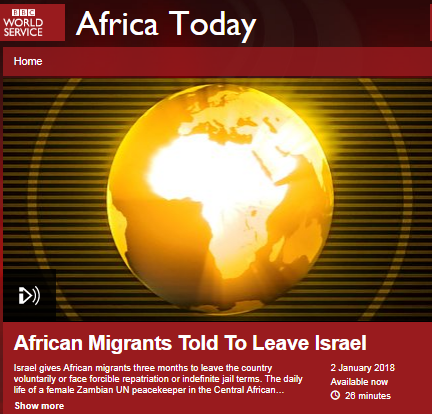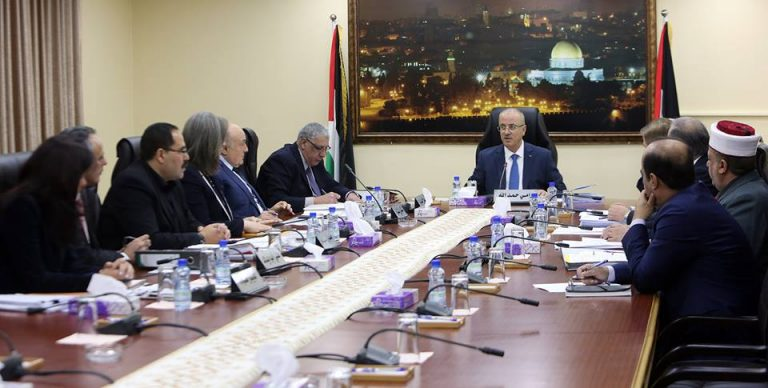h/t BF
As readers may be aware, the BBC sometimes appends a footnote to relevant articles concerning its use of the term migrant.
“A note on terminology: The BBC uses the term migrant to refer to all people on the move who have yet to complete the legal process of claiming asylum. This group includes people fleeing war-torn countries such as Syria, who are likely to be granted refugee status, as well as people who are seeking jobs and better lives, who governments are likely to rule are economic migrants.”
That editorial policy was also the subject of an article published on the BBC News website in August 2015.
However, listeners to the January 2nd edition of the BBC World Service radio podcast “Africa Today” heard presenter Bola Mosuro repeatedly use terminology that does not conform to that editorial policy.
Mosuro:”Coming up: Israel gives over thirty thousand refugees and asylum seekers just three months to leave the country voluntarily. If not, they will face indefinite jail terms or be forcibly repatriated.” [emphasis added]
In addition to her use of partial language to describe migrants, Mosuro’s claims that they “face indefinite jail terms” or being “forcibly repatriated” are inaccurate. Repatriated of course means being sent back to one’s own country but that is not what the programme entails.
In August last year Israel’s High Court of Justice unanimously passed a ruling on the issue.
“The High Court of Justice on Monday allowed Israel to continue with its controversial practice of deporting illegal migrants to an unnamed third country, but said the government cannot jail those who refuse to go for more than 60 days.
The judges unanimously rejected a petition by human rights groups against the deportation practice, but stressed that the deportations could only to be carried out with the agreement of the migrants.
The court also ruled that the Israeli authorities had to first ensure that the third country was safe.”
Introducing the item itself (from 00:56), Bola Mosuro again employed language that is not in line with the BBC’s stated policy of using the term migrants and also contradicted her own previous claim of repatriation. [emphasis in bold added]
Mosuro: “We start in Israel where more than 34,000 refugees or asylum seekers have been served notice. The refugees, mainly from Eritrea and Sudan, were told by the immigration and border authorities yesterday they have just 90 days to leave the country. If they do not leave voluntarily, the Israeli authorities will jail them or deport them to either Uganda or Rwanda – two nations they’ve made agreements with. The details of these deals have not been made public to the United Nations High Commission for Refugees, which has expressed concern. Walpurga Englbrecht, who is the UNHCR representative in Tel Aviv said what they do know.”
Englbrecht’s explanation further clarifies that Bola Mosuro’s use of the term ‘refugees’ is inaccurate and misleading.
Englbrecht: “So those who are going to leave voluntarily will receive a grant of $3,500 and also a paid air ticket. And those who are targeted are those without a pending asylum claim – meaning that they have never applied for asylum or they were rejected – and those who submitted claims for asylum after the first of January.”
BBC audiences later heard Englbrecht promote unverified claims found in media reports which have since been refuted by the Rwandan government.
Englbrecht: “And unfortunately there has been further developments according to which – again, what has been reported in the media – it is said that Rwanda did agree to also accept those who are going to be forcefully relocated to this country.”
When the BBC reported last month on similar schemes in Europe, it described the people offered grants as migrants or asylum seekers rather than refugees.
“[Germany] has long offered migrants and asylum seekers financial incentives to leave its shores, and until 28 February 2018 it’s prepared to pay out extra. […]
According to Dr Jeff Crisp, a Fellow at the Chatham House think tank, so-called “voluntary return” programmes for asylum seekers have been around for at least 20 years, and everywhere from Australia to the UK and Canada has tried them. […]
Sweden currently offers grants of 30,000 Krona (£2,653; $ 3,550) for lone migrants and 75,000 for families, paid as a lump sum in US dollars.
And in spring 2016, nearby Norway made headlines for adding a 10,000 kroner “bonus” onto its existing rewards package for the first 500 asylum seekers to apply.”
Not for the first time we see that BBC coverage of stories concerning migrants in Europe and in Israel lacks consistency.
Related Articles:
Differences in BBC coverage of migrants in Europe and in Israel




